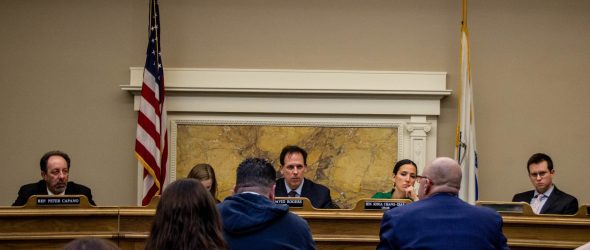By Devyani Chhetri
BU News Service
BOSTON – Healthcare is expensive, and no one knows it better than Iraq veteran Stephen Mandile.
During his tour in 2005, a Humvee crash injured his spinal cord, leaving him with chronic pain and overwhelming post-traumatic stress. Veterans Affairs (VA) physicians gave him a prescription of close to 56 medications, some of which were opioids.
A debilitating opioid addiction and a suicide attempt later, Mandile looked for alternatives. He found his answer in marijuana.
“Cannabis has helped me achieve dealing with my mind, body and soul,” Mandile said. “It has helped me become the kind of father, husband and son I know my family deserves.”
But marijuana, which can cost close to $60 for a quarter of an ounce in Boston, is expensive. For veterans like Mandile, being able to afford the drug is dependent on owning a medical marijuana card.
But Massachusetts does not recognize post-traumatic stress disorder as a qualifying condition for a card, Mandile said Tuesday in a public hearing on bill H.4274. The bill seeks to extend the number of disabilities that qualify as a condition for using medical marijuana.
State Rep. Michael J. Soter, R-Worcester, filed the bill in the Legislature and sat next to Mandile at the hearing.
“I used to be a staunch non-believer,” Soter said. “But having seen its positives, I believe that it is up to us as legislators to give resources other than opioids to our veterans.”
According to a 2017 study done by the Department of Public Health, veterans represent one of seven at-risk groups in Massachusetts that are vulnerable to fatal or non-fatal opioid overdoses. A survey performed by the Iraq and Afghanistan Veterans of America (IAVA) in 2019 said 83% of veterans believe that cannabis should be legal for medicinal purposes.
But veterans face a federal hurdle. Cannabis is a Schedule I substance according to federal law. Hence, VA healthcare providers cannot prescribe marijuana as a treatment.
If not for VA healthcare providers, veterans could spend over $200 for a consultation with a private physician. These physicians are necessary for getting a medical marijuana card, according to the current Massachusetts cannabis law.
Rep. Soter’s bill proposed that patients do not need a second evaluation by a physician to justify the use of marijuana in order to purchase a card. The first diagnosis of their disability by a registered physician or the VA would be enough to purchase non-taxed medicinal marijuana.
Shaleen Title, the commissioner of the Cannabis Control Commission, said that the commission has been in touch with several members of the veteran community in the state and endorsed the bill.
“It is burdensome, redundant and expensive,” Title said about the current law.
But not everyone agreed with what the bill offered. Frank Shaw, 67, who suffers from HIV/AIDS, said that the bill catered to veterans and ignored other marijuana-using patients like him.
“Patients with conditions like ours lack the kind of organization and support that some like the veterans have,” he said.
For Shaw, the proposed provisions of the bill could jeopardize the existing medical program, which currently limits physicians at a 60-day supply to ensure that medical marijuana users do not have to pay the state and local marijuana taxes, which push costs up by 20%.
Without a required physician to oversee the supply, Shaw said that excessive cannabis consumption by veterans could have consequences on marijuana’s taxation.
“Any changes to my tax rate will threaten the affordable safe access I depend on,” Shaw said.
The bill remains in hearings with the Joint Committee on Cannabis Policy.


